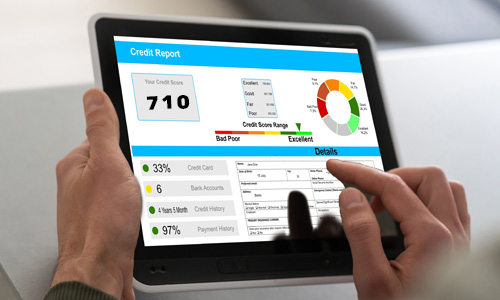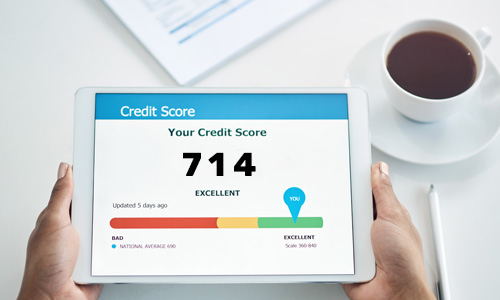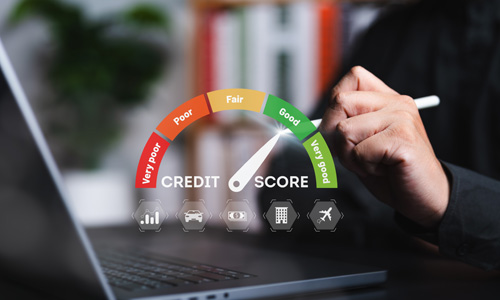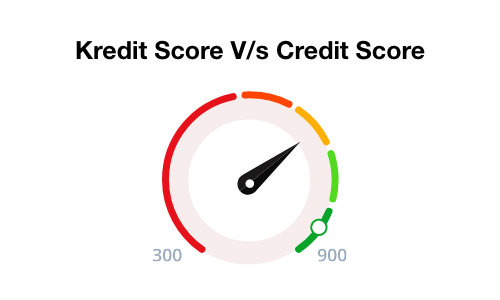- What is the AECB Report Used For?
- AECB Report Terms — What are They?
- How to Get an AECB Credit Report?
- What Information is Not Included in the AECB Report?
- What if the AECB Credit Report has False Information?
- How to Submit a Data Correction Request — Form and Document Requirements
- How Much Does the AECB Report Cost?
- Al Etihad Credit Bureau Report FAQ's
AI Etihad Credit Bureau Report - Check Free Credit Score
The Al Etihad Credit Bureau (AECB) issues credit reports that provide a detailed overview of your credit history and financial behaviour. This report includes your personal information and details of all your credit accounts such as loans and credit cards. With your payment history over the past 3 years, including any missed payments or bounced cheques.
The key aspects of the AECB report include—
- Credit summary
- Payment history
- The status of any defaults
- Overdue payments
- You can easily get your AECB credit report through the Etihad Credit Bureau CreditReport app or the official AECB website (with your Emirates ID).
What is the AECB Report Used For?
The data in this report is sourced from banks, financial institutions, telecom and utility companies, and courts to get a picture of your financial behaviour.
Companies use this credit report in the UAE to evaluate your creditworthiness when you apply for credit or services. It helps them assess the risk involved in approving your credit card or loan, ultimately guiding their decision on whether to approve or reject your applications.
AECB Report Terms — What are They?
Here are some key terms mentioned in your Etihad Bureau report that you should be familiar with —
Credit Summary: This presents a quick overview of your credit health. It reflects your overall debt situation and payment history, summarising your financial obligations and any potential issues. It includes —
- Total Overdue: The sum of payments that are past due and have not yet been paid
- Number of Default Contracts: The number of credit agreements where payments have been missed and the account is considered in default
- Total Outstanding Balance: The total amount of money you still owe on your credit accounts
Other Incomes: Any additional sources of income you receive, apart from your primary business activities, like a family business
Unpaid Direct Debits: This section of the AECB report mentions payments that were scheduled to be automatically withdrawn from your bank account but could not be completed due to insufficient funds or other issues
Important: These failed transactions can negatively impact your credit report by indicating missed financial commitments
Bounced Cheques: Cheques that could not be processed because there were insufficient funds in the account. It means the bank returned it unpaid, which can negatively impact your credit report.
Credit Facilities: This part of the AECB credit report includes overdraft facilities, credit cards, loans, and credit letters — usually more flexible than typical loans. Such facilities are a form of borrowing that both individuals and businesses can utilise to finance their operations for a specific time.
Total Outstanding Balance Distribution: Breakdown of your total debt across different types of credit facilities or accounts such as credit cards, loans, or credit lines
Main Contract Holder: The primary person or entity responsible for repaying the debt and managing the credit account. They are legally accountable for the terms of the credit agreement, including making payments and adhering to the terms.
Co-Contract Holder: An additional person or entity who shares responsibility for the credit agreement with the main contract holder
Both the main and co-contract holders are involved in managing the credit account — any issues or changes in financial status are reported to both parties.
Credit Providers: In the AECB report, it refers to organisations or banks that have given credit or loans to you
Card Used Flag: Indicates that a credit card has been used for transactions or purchases in the previous month of reporting
Islamic Contract Flag: This shows whether the contract or credit agreement is based on Islamic finance principles or not.
Secured Contract Flag: This indicates whether the credit contract is backed by collateral or security. If this flag is present or marked, it means the contract is secured with assets to ensure repayment. If it’s not specified, it might imply the contract is unsecured.
Awaiting Correction Flag: It means whether there is a pending update or correction needed for the credit information. If this flag is present, it means that the reported information might be under review or correction.
Credit Limit Utilisation (%): Under this part of your AECB report, you get the percentage of your total credit card limit that you are currently using.
For instance, assume that you’ve 2 credit cards with a limit of AED 10,00 on each card. You’ve used AED 1,500 on one card and AED 2,500 on the other one.
- Total credit limit: AED 10,000 x 2 = AED 20,000
- Credit used: AED 1,500 + AED 2,500 = AED 4,000
Credit Utilisation Rate: (AED 4,000/AED 20,000) x 100 = 20%
Keeping your utilisation low (generally below 30% of the total limit) can show good creditworthiness.
Worst Status Default: Indicates the lowest or the worst status of the account or contract since you obtained it first
Worst Current Payment Delay: The longest period for which your account is currently overdue or late on payments. A 30-day or more delay is considered serious, affecting credit scores.
Worst Payment Delay Last 24 Months: The most significant delay in payments that has occurred over the past 2 years. It reflects the longest period of overdue payments within this time frame.
Historical Data: In an AECB credit report, it’s the record of your credit-related activities and financial behaviour for the last 2 years.
This section shows your payment behaviour, including any missed or late payments on credit accounts, loans, and other financial obligations.
Contact and Employment Details: This includes your email and phone details, current address, record of employment, and more.
Expense to Salary Ratio: Provides insight into your monthly expenses against your salary. This ratio contains all of your spendings — loan payments, credit card bills, utility expenses, and more.
How to Get an AECB Credit Report?
Here are the steps to get your AECB report —
- Download the official Etihad Credit Bureau Report app
- Scan your Emirates ID to log in or register in the app
- Select ‘Credit Report’
- Make a payment and get your UAE credit report
|
If you are curious about what the AECB credit score is and how it works, read this and find out everything you need to know. |
What Information is Not Included in the AECB Report?
When it comes to your credit score, the Al Etihad Credit Bureau report focuses on how well you manage your debt and track your financial behaviour and transactional history.
However, not all aspects of your financial life are included in this evaluation.
Here’s what the AECB report does not consider —
- Savings and Investments: Your savings accounts and investment records are not factored into your credit score.
However, if you’ve taken out loans to fund investments like cars or homes, those loans will appear on your credit report. - Personal Information: Details such as your marital status, past criminal records, or education are not used in calculating your credit score.
- Medical Information: Your health status, including mental and physical conditions, is not disclosed or used in your credit evaluation.
However, any medical payments related to credit accounts may be reflected on your Etihad Bureau credit report.
What if the AECB Credit Report has False Information?
If you spot incorrect details on your credit report in UAE, here’s what you should do —
- Gather Supporting Documents: Collect any relevant paperwork that proves the information is wrong such as bank statements or official letters.
- Submit a Data Correction Request: Fill out the data correction form provided by the Al Etihad Credit Bureau. Make sure your form is complete and includes all necessary attachments. Inaccurate or incomplete forms will be automatically rejected.
- Wait for Processing: The AECB doesn’t alter your credit report directly. Instead, it sends your correction request to the relevant data provider.
The data provider is then responsible for making the necessary updates. So how long it will take relies on third-party actions.
Timeline: As per the Central Bank of UAE’s regulations, data providers have to respond to correction requests within 10 working days.
How to Submit a Data Correction Request — Form and Document Requirements
You may need to fill out two forms for filing a data correction request on the official AECB website.
The first form will require your details, including —
| ✅ Full Name | ✅ Emirates ID | ✅ Email Address | ✅ Mobile Number |
| ✅ Purchase Date of the AECB Credit Report | ✅ Information Provider Name | ✅ Etihad Credit Bureau Subject ID |
The second form is for the data field and requires —
| ✅ Provider Contract ID | ✅ Credit Report Section | ✅ Field Name | ✅ Reference Date |
| ✅ Current Value to be Corrected | ✅ New Value | ✅ Description of the Requested Correction |
Documents Required (Scans or Downloads)
- Emirates ID
- Trade Licence (if applicable)
- Credit Report Purchased Within 30 Days
- Supporting Documents (not mandatory)
How Much Does the AECB Report Cost?
Here are the detailed charges for your AECB credit report —
| Category | Online Price (AED) | Walk-In Price (AED) |
|---|---|---|
| Individuals | 84 | 105 |
| Establishments | 84 | 105 |
| Companies | 157.5 | 189 |
Important: The charges above include 5% VAT.
| Credit Score for different types of Loan | |||
|---|---|---|---|
| Credit Score for Personal Loan | Credit Score for House Loan | Credit Score for Car Loan | Credit Score for Student Loan |
Al Etihad Credit Bureau Report FAQ's
Ans: The AECB credit report is a comprehensive record by the Al Etihad Credit Bureau that details your credit history and financial behaviour over time.
Ans: Your credit activity, debt-burden ratio, how timely you pay your bills, and other factors are used to calculate your AECB credit score.
Ans: You can check your credit score for free on Policybazaar.ae. However, if you want the full AECB report, you can use the official AECB app or website.
Ans: You can get your Etihad Credit Bureau Report via email within 8 hours after applying.

More From Credit Score
- Recent Articles
- Popular Articles












